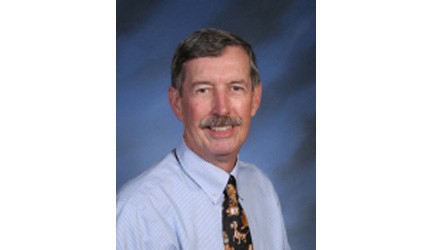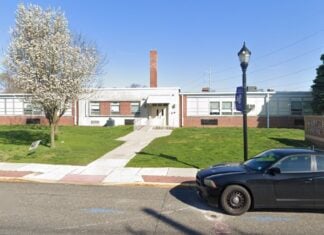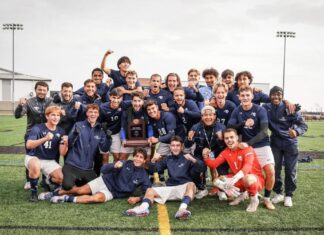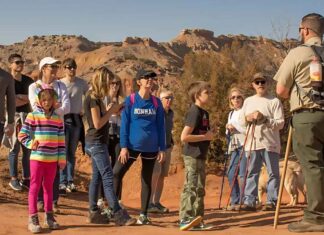
Laird is slated to retire from his position at the end of December.

Anyone who has attended a Cherry Hill High School West sporting event over the past 30 years has likely seen long-time athletic trainer John Laird at work.
Since 1988, Laird has been a fixture on the Cherry Hill West sidelines. He could frequently be seen talking with coaches on the sideline, taping an athlete’s ankle before a big game, getting ice for a player’s injured knee, helping an injured player to the sideline and more. He has watched thousands of student-athletes compete for the Lions and has helped many recover from injuries to get back on the field.
After decades of playing a big role in Cherry Hill West’s athletics, Laird’s time as the Lions’ athletic trainer is coming to a close, as he is slated to retire on Dec. 31.
“I’m going to miss the kids,” Laird said. “I’ll miss the staff, miss the parents.”
Laird’s journey in athletic training began as a kid in 1963. Growing up in Lewisburg, Pa., Laird got the opportunity to become a manager for the local high school’s football team.
“They had, at the time, student athletic trainers in upstate Pennsylvania,” Laird said. “They had a vet that was an Army nurse. He was their lead person.”
To familiarize himself with some athletic training basics, Laird visited nearby Bucknell University, where his father worked. Long-time athletic trainer Hal Biggs, a member of the National Athletic Trainers’ Association Hall of Fame, gave Laird some tips.
“He took me under his wing, taught me some athletic training basics, told me about a correspondence course,” Laird said. “I took it during the summer.”
Those tips made Laird fall in love with athletic training. He worked as a student athletic trainer through high school and decided to pursue athletic training as a career. He first attended Lock Haven University and later transferred to Western Illinois University, where he became the school’s first athletic training graduate. Laird graduated at a time where there were few schools offering athletic training as a major.
“I think there was 13 schools in the country with athletic training curriculums,” Laird said. “It wasn’t a big area.”
Prior to arriving at Cherry Hill West, Laird worked at the college level. He had short stints at Bucknell and Rutgers University before spending about 11 years at St. Joseph’s University.
In 1988, Laird decided to make the move to high school. He was hired at Cherry Hill West and was immediately impressed at the school’s commitment to keeping its athletes healthy.
“The administration wanted to take care of its student-athletes and wanted to take the best care of its students,” Laird said.
The Man has arrived!!!
A lot has changed in high school athletics and athletic training during Laird’s tenure at Cherry Hill West. One of the biggest changes has been the treatment of concussions. Laird feels Cherry Hill West has always been near the forefront in its treatment of the injury and said the school was focusing on the seriousness of concussions years before the injury was talked about widely in the media.
“I think we have been pretty much in the forefront of that in being involved with recognition of concussion,” Laird said. “In the late ’90s, we had protocol. Then we got involved in the early 2000s doing imPACT testing for our kids. Then we put a school policy in.”
The field of athletic training has also changed a bit. Laird said many trainers take a more individualized approach today to address the specific needs of an individual athlete.
”We work within the parameters, you listen to your patient, each one is on an individual basis,” Laird said. “There’s no cookbook, but you have a general idea what you want to do.”
Laird has also seen changes in the way he communicates and gets around Cherry Hill West’s campus. With the school’s fields spread out, it’s impossible for Laird to keep an eye on every athlete at one time. In recent years, cell phones have been used so coaches and staff can call Laird when he was needed. Before cell phones were widespread, however, two-way radios were used to communicate.
“What happens with the two-way radios is they get put into the first aid kit, and kids start playing with them,” Laird said. “They turn them on and then forget to turn them off when they put them back into the kit. The kit sits there for two days and then when it comes back out, it hasn’t been charged up. Once cell phones came into effect, it was all cell phones.”
Laird has used multiple vehicles to get around from field to field during his career.
“I was using a converted used golf cart with a platform on the back so we could carry stuff and move it around,” Laird said. “A few years ago, we upgraded to a John Deere Gator. That added 10 years to my career.”
Even with all the right tools, being an athletic trainer in a high school can be a hectic job. Hundreds of student-athletes compete in a single season in as many as nine sports. When multiple teams are playing at one time, it could lead to a busy day for Laird.
“One time, boys soccer was here at all three levels, girls soccer had one game here and a volleyball game going on, all at the same time,” Laird said. “In addition, we had football practice going on and the cross country team was out running, boys and girls.”
Over the years, Laird has been on sidelines for many big moments for Cherry Hill West athletics. Some of his favorite memories came early in his tenure. The first year he arrived at Cherry Hill West coincided with the baseball team’s 1989 Group IV state championship. That championship was the first of four consecutive for Cherry Hill West.
Laird also has many memories of the annual East-West Thanksgiving football game. He likes to talk about some of the great plays West players have made in those games, including an outstanding touchdown catch junior Naiem Simmons made in this year’s game.
Laird also remembers the wild weather conditions accompanying some of the Thanksgiving games. He recalled one year where it was sunny, rained, sleeted and snowed all during a single game. Laird also remembers the numerous mud games taking place at Cherry Hill West prior to the installation of artificial turf.
“Bernie O’Connor was our coach,” Laird said in recalling one game. “He ran out to tell somebody something during a timeout and his foot got stuck in the mud. His shoe was left there.”
Perhaps the most memorable East-West game for Laird is the last one he worked on Nov. 22. At the end of the first quarter, Laird was treating an injured player when he was asked to head out to midfield. There, Cherry Hill West Principal Kwame Morton and head football coach Brian Wright presented Laird with a commemorative football for his many years of service.
A fitting farewell to a wonderful man.. thank you for 29 plus years Mr. Laird
“I wasn’t sure what was going on. I figured they’d just make an announcement. Then Dr. Morton came out with the football and made a nice comment about appreciation and dedication,” Laird said. “It was very humbling.”
Cherry Hill West went on to win the game, 48–12. As the Lions were being presented with Golden Boot trophy for winning the game, Laird was cleaning up when he noticed something.
“The Boot goes in and all of a sudden, The Boot comes running out and here comes (senior Tyrell Lewis) running across and he hands it to me,” Laird said.
Laird received one more gift after the trophy presentation. When Wright huddled with his team for the post-game pep talk, he invited Laird over and presented him with the game ball.
Wanting to preserve the game ball for the rest of his life, Laird pulled out the sharpie he always carried around and asked the players and coaching staff to sign it.
Laird said he’s very grateful for all of the well wishes he’s received over the past few months. He is happy to know he had a positive impact on many student-athletes over the course of almost three decades simply by doing his job.
“When (the athletes) turn around and say thank you, I say that’s what I’m here for, to take care of you,” Laird said.









